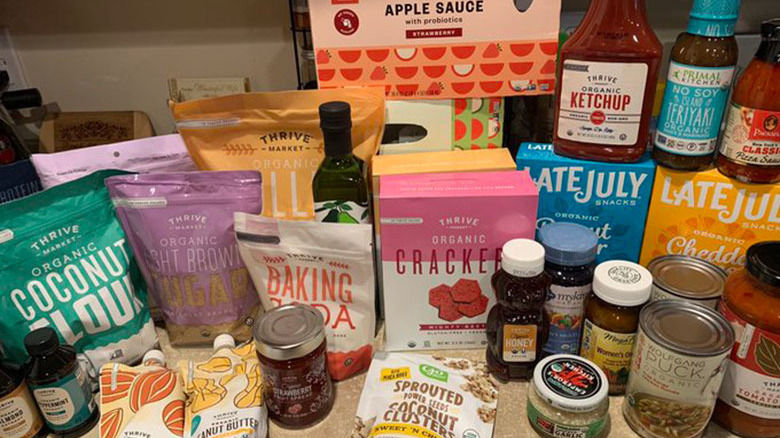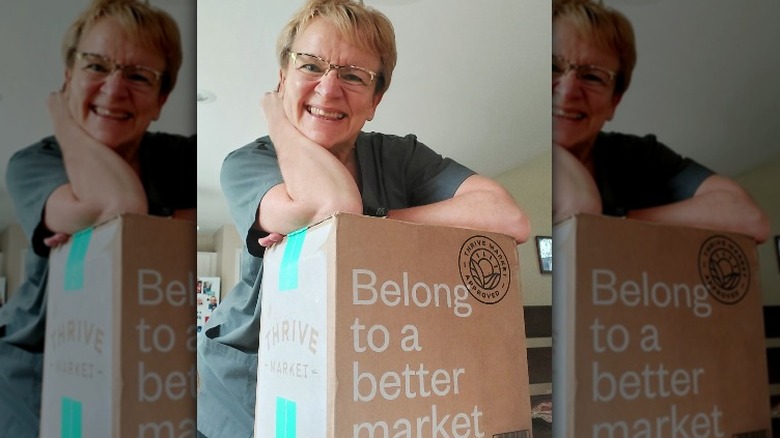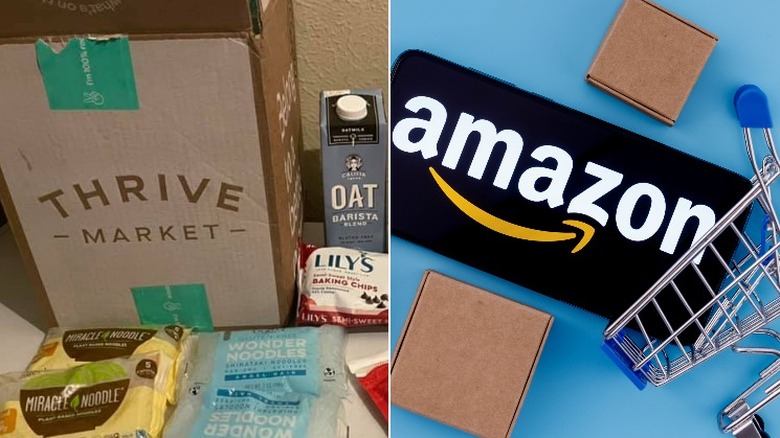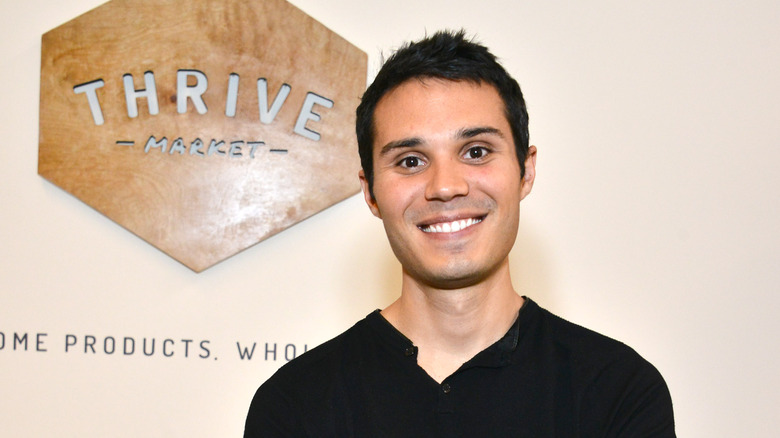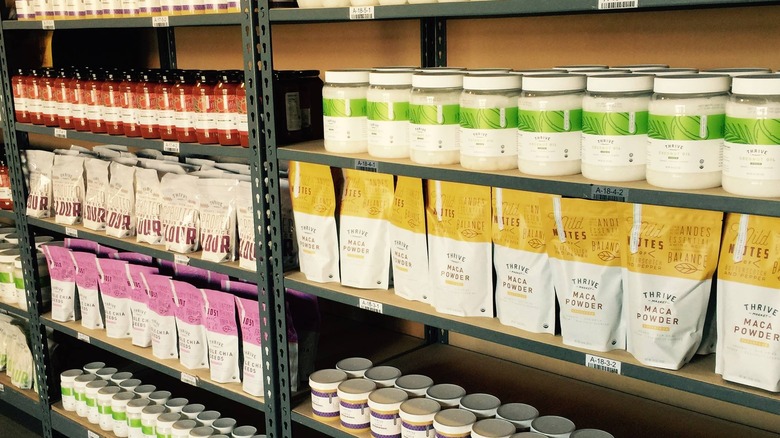The Untold Truth Of Thrive Market
Since its launch in 2014, Thrive Market has sought to give grocery shoppers a better, more convenient way to buy their groceries and staple household items. Through its online platform, the company lets members shop for natural and organic products at affordable prices, allowing healthy eating to be more accessible for all. Thrive Market really commits to this mission, too, going so far as to donate a free membership to someone in need when a customer purchases a membership.
In the few years it's been around, Thrive Market has, well, thrived. The pandemic has certainly helped propel the online grocery retailer to success, shooting its 40% year-over-year revenue increase to 90%. However, it's the company's curated selection and focus on health and wellness that seem to keep it on track toward growth (via Forbes). Co-founded Sasha Siddhartha tells Forbes, "Our approach has always been curated, so you don't have to worry about which brand is better for you or spend time studying the labels. Our merchandising team has already done the work for you to pre-select and curate based on the highest standards in the industry."
Read on to learn everything you've wanted to know about Thrive Market, like how it came to be and how it's dominating the organic online shopping space.
Thrive Market is the brainchild of four entrepreneurs on a mission
Unlike many companies with one or two founders, Thrive Market has four, and they're all incredibly knowledgeable and business-minded, making for an undeniably strong and passionate foursome. Several years after creating Thrive Market, all four co-founders are still in the company, with Nick Green and Gunnar Lovelace sitting as co-CEOs, Kate Mulling as the vice president of content and branding, and Sasha Siddhartha positioned as the chief technology officer.
According to Forbes, Thrive Market started as a way to bring healthy packaged foods to the masses. More specifically, the founders wanted to cater to a population of middle-class mothers who found alternatives like Whole Foods not as affordable or accessible. On the Thrive Market website, Nick Green writes about his own mother and how challenging it was for her to put affordable, healthy options on the table. Thirty years later, he says, "Finding convenient, trusted, and affordable ways to shop healthier is still hard. At Thrive Market, we're on a mission to change that."
50 investors originally said no to Thrive Market
Although Thrive Market has exhibited success since launching in 2014, it wasn't quite the hit the founders expected it to be initially — at least, to investors. In a 2017 interview with Grocery Dive, co-founder Gunner Lovelace said that 50 venture capitalist investors originally turned down the concept, mostly due to skepticism that Thrive Market would be able to dig its way into an already successful industry. "Plus, investors thought our financial projections of $10 million in our first year and $35 million in our second were unrealistic," admits Lovelace.
However, that didn't stop the founders' mission to make their idea work. They got busy pitching their company to individual investors, including wellness industry influencers like Jillian Michaels and Deepak Chopra, scooping up 200 people who were ready to invest (per Forbes). "We ended up beating our second year projections during our first year in business, doing $45 million in revenue over the first 12 months," said Lovelace (via Grocery Dive).
Thrive Market donates free memberships
Want a membership to Thrive Market but can't fit it in your budget? Thrive Market makes getting a membership easier for people in need through its Thrive Gives program. The charitable program allows families who may not be able to afford a membership to receive one every time someone else signs up for a paid one. Likewise, if you pay for a membership, you automatically gift a free membership to someone in need.
Thrive Gives also gifts memberships to nurses, first responders, students, teachers, and veterans, as a way to say "thank you" for their help within their communities. If you fall into one of those categories, simply indicate your status when you sign up. After verifying your information, Thrive Market grants you access to a membership at no cost to you.
Thrive Market encourages others to get involved in its charitable efforts, too. Members can donate what they save to the Thrive Gives program to sponsor these free memberships or donate to partnered charities that the company supports.
You can now buy clean wines from Thrive Market
In 2018, Thrive Market moved into a space that hadn't quite been popularized yet: selling wine online for people to get delivered straight to their doors. And it wasn't just any wine; Thrive Market went way ahead of its time by debuting a full lineup of clean wines, or ones made from grapes that were sustainably farmed and free from chemical additives per Supermarket News. CEO Nick Green explained in the same article, "Seventy-five percent of our members are drinking wine more than twice per week — it's sort of their indulgence of choice — yet very few, if any, are aware of the chemicals and additives that are in most wines. So there's a big opportunity to go and create a program for clean wine."
According to Thrive Market, the company's winemaking partners also commit to minimal refining and filtration, no added sugar, and limiting problematic preservatives. The lineup still exists today and seems to be going strong. The company has even created a wine club in which members can receive six bottles of wine every season for a discounted price when set to auto-ship.
Its controversial membership fee holds some benefits
If customers have one complaint about Thrive Market, it's the membership fee, which you can purchase monthly or annually. One reviewer on Facebook specifically mentions how frustrating it is that non-members can't view the products and prices on the website without signing up for a membership. Another reviewer on SiteJabber mentions that several items they wanted were out of stock, stating that Thrive Market is "not worth the membership fee per month if I still have to go to the store to get staples."
However, Thrive Market insists that its membership fee is necessary to give members access to exclusive pricing and other benefits. First, CEO Lovelace explains (via Fast Company) that the lower prices are due to being able to cut out middleman sellers by buying directly from brands. It also partners with smaller brands that don't sell on Amazon, where they need to boost prices to account for selling fees.
Another benefit of being a member is shoppers don't need to research the products they're buying because Thrive Market takes care of that. Its selection is carefully curated to ensure that the company only offers organic and ethically sourced products (per Recur).
If you need a few more reasons to become a member, here are a few touted by the company: convenient online shopping, members' access to free samples, free shipping on $49+ orders, and getting money back in their accounts if their savings don't equal the annual membership fee.
It has a longstanding competition with Amazon
From the start, Thrive Market's founders prioritized making the company stand out by offering more convenience and better pricing to its customers. In doing so, Thrive Market set its sights on Amazon, specifically looking to place better prices on healthy and organic foods. Thrive Market's founders also wanted to give people in areas without access to healthier food options an easy way to get the foods they wanted but without the higher prices Amazon offered. According to Fast Company, Thrive Market prices most of its products up to 15% below Amazon's.
In purposely underpricing Amazon, Thrive Market has begun somewhat of a competition between itself and the gigantic online retailer. Customers ultimately decide which company they prefer to shop with, but Thrive Market does have some clear benefits over Amazon. For example, Retail Dive states that, in addition to better pricing, Thrive Market pulls ahead of Amazon with its quality, carefully-selected inventory. Additionally, Thrive Market's commitment to organic, natural, and eco-conscious products and do-good social campaigns could give it an edge over other retailers (via Fast Company).
One founder donated his salary during the pandemic
Keeping with the do-good spirit of the Thrive Market brand, co-CEO and co-founder Nick Green decided to donate his salary near the beginning of the COVID-19 pandemic. In April 2020, Green wrote an article on the Thrive Market blog thanking members for their continued support of the company as it, like other companies, pushed through pandemic-related challenges to meet its customers' needs. At the end of the article, Green also announced his donation: "The goodness of this community inspires our team every day and today it's inspired me personally. That's why I've decided to donate my salary as Thrive Market CEO for the remainder of 2020 to the COVID-19 Relief Fund — to ensure that every deserving family who applies for a grant can become a recipient."
The Thrive Market COVID-19 Relief Fund was put in place in March 2020 to make food and necessities accessible to those who needed it most during the pandemic. The latest update from the company in June of that year announced that, with the help of members and brand partners, the fund raised over $650,000.
Thrive Market's private food label is one of its most successful brands
Thrive Market sources products from a curated selection of brands with values that align with the company's values. As a member, you can shop products from Simple Mills, Seventh Generation, Daring, HUM Nutrition, and more. But Thrive Market has also jumped into the organic health food space by launching its own private label in 2016. The label started with 165 of the company's most popular types of items and has continued to expand (via Digital Commerce 360).
As of late 2021, the lineup included 746 private-label products, including the company's Thrive Market and Wellmade brands. According to senior director of Thrive Market brands Jenna Engleman (via Food Navigator USA), the idea behind the private labels was to offer "affordable clean versions of core necessity products" and "innovative items that they can't get anywhere else." According to Food Navigator USA, the company generates about one-quarter of its sales from its private labels alone.
Thrive Market isn't stopping there. In early 2022, the company debuted Rosey, its lineup of cleaning products with reusable packaging and affordable prices (via Retail Brew).
The company was forced to stop sales of CBD and hemp products
In 2018, Thrive Market was one of the first ecommerce companies of its kind to begin selling a variety of hemp and CBD products online. According to a post on the Thrive Market blog written by Green, the company did plenty of research on these types of products before adding them to their offerings, including following health and legal research. For about 18 months, the sales continued. However, in June 2019, the company's merchant processor disallowed it from selling these products to customers. Although Thrive Market's hands were tied, Green insisted that "ethical and sustainable hemp is another cause worth fighting for, so rest assured that we will be working behind the scenes in the coming weeks to get hemp products back on Thrive Market." He also mentioned that the company would be actively seeking a new merchant processor that would allow the sales.
Apparently, Thrive Market got its way. Members can find a full range of hemp and CBD products to add to their shopping carts once again, including CBD oil for pets, CBD oil gummies, and hemp extract tinctures.
Don't expect as much variety as grocery stores
Enter a supermarket, and you'll probably find just about everything you need to stock your fridge, freezer, and pantry. Head to Thrive Market, and the selection won't be as varied. According to Statista, conventional grocery stores carry about 15,000 items at any point in time. Thrive Market has less than half that, with about 6,000 different products on its virtual shelves (per CNN).
While this might make you feel a little limited when shopping, you should know that there's a reason behind the smaller selection. Chief merchandising officer Jeremiah McElwee explains on the Thrive Market website, "Our impact starts with the products we choose to carry. That means saying 'yes' to brands and suppliers that align with our vision of a healthier planet and often 'no' to those that do not hold the same ideals." In other words, the company is picky about the brands and products it selects so that everything it sells fits its mission. That includes turning away any item that includes one of 500 banned ingredients the company refuses to sell and making sure that all items are non-GMO.
Thrive Market strives to reduce its carbon footprint
Thrive Market emphasizes healthy options at affordable prices and innovates ways for people across the country to get those healthy foods conveniently. But the company also prioritizes the planet's health by having policies in place to reduce its carbon footprint.
Sustainability is a key focus of Thrive Market. The company has committed to reducing the use of plastic in its private label products and making its warehouses more sustainable through effective recycling practices that reduce waste. As of 2022, two Thrive Market warehouses have been labeled TRUE Certified for Zero Waste. Thrive Market also has a goal of becoming carbon negative by 2025 (per Thrive Market).
Interestingly, the company made a lot of progress in its sustainability efforts through 2020, one of the most challenging years for many businesses due to the COVID-19 pandemic. That year, Thrive Market officially became a certified B corporation, meaning that its business decisions must take into consideration their potential effects on the environment and communities. It also reduced its carbon emissions by 90% through remote working, added more than 600 non-GMO products, and supported planting 1,000 lenga beech trees in Chile to reduce carbon emissions (via Thrive Market).
Its unique shopping filters help you support social causes
Thrive Market is extremely transparent in its do-good work and support of social and environmental causes, like sustainable living, food accessibility, and LGBTQ+ support. Each time you check out, you can also donate the money you've saved to the Thrive Gives program to join in.
But if you love the causes that Thrive Market works toward and want to have more ways to support causes that are important to you, you can do that by shopping. When you shop on the site, you can browse products in the usual ways, like by product type, by brand, or by specific diets. However, Thrive Market also gives shoppers a unique way to shop: narrowing down items by social cause. For instance, browse products that come from woman-founded businesses or BIPOC-founded businesses. Choose only products made in the USA or marked as turtle and dolphin-safe. It's an excellent way to ensure that you shop for the causes you support the most. To do it, use Thrive Market's sitemap, locate your cause, and click the link to view all matching products.



